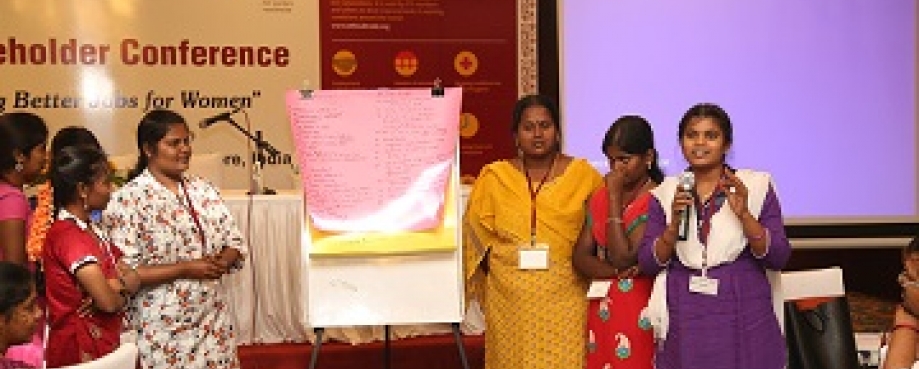
I’ve been reflecting on two very different lives. The first, a young female spinning mill worker, Shivapriya from Tamil Nadu who stole the show at a recent review day of an ETI workers’ rights project in India. The second was that of Maud Watts (played by Carey Mulligan), the fictional heroine in the film Suffragette.
A few days ago I watched the film Suffragette on a rather cramped flight back from Asia.
Set in 1912, Maude a young worker in a laundry in East London started her working life at 7-years-old. A dutiful and hard-working young woman, Maud suffers long hours, little pay and harsh working conditions.
By accident she is exposed to the suffragette movement and starts to realise that the life she has can change if she speaks up for her rights. And she does so, even though by speaking, she suffers terrible violence from men, determined that the status quo should be maintained.
Sharing experience as a peer educator in Tamil Nadu’s spinning mills
Before watching the film, I had met Shivapriya, a young woman worker from a spinning mill in Tamil Nadu. She had the courage to share her experience as a peer educator in our Tamil Nadu Multi Stakeholder (TNMS) project in front of an audience of over a hundred.
When challenged by a much older man that she had been coached to relate what she was saying, Shivapriya refused to be cowed. Instead she responded saying that this was her own experience and that she could not be coached to tell her own story.
Her response was greeted by applause. Rightly.
Young women speaking up for workers' rights
Shivapriya was one of 20 women mill workers who took a fully active part in the one-day review. The meeting brought together workers, trade unionists, NGOs, mill employers and international brands to review project progress and share lessons learned from this and other initiatives.
All parties were given a full chance to contribute their opinions and perspectives, but it was these young women who stood up in front of such an international group, displaying the confidence that they have found as peer educators to other workers in the mills, that stole the show.
Using women’s health as an entry point to gaining greater labour rights
The TNMS project has not been without its critics as it set out to use women’s health in the workplace as the entry point to build constructive relationships with management and supervisors, and thereby gain access to workers to help start a dialogue in their workplace.
The project initially provided a platform to address women’s basic health and nutrition needs and women workers at the review day reported that they now took better care of themselves, better understood the importance of a good diet and how to manage menstruation in the workplace.
However, they did not stop there.
Workers, including Shivapriya, also raised issues about working hours, the need for proper salary slips and other rights at work.
The right to freedom of association and collective bargaining
We are, admittedly, a long way from addressing all issues, or indeed enabling these women to exercise their right to choose to join a trade union and be represented in collective bargaining. But as a senior trade unionist, who had been rather critical early in the day acknowledged, what we witnessed was empowered workers speaking up for themselves.
And the link with Maude the suffragette?
Once young women are in an environment where they learn that they have rights and that their conditions are not pre-ordained, they can learn to speak up for themselves and take an active role in change.
Creating awareness and enabling dialogue leads to change
ETI believes that creating awareness and enabling a dialogue between workers and their employers can and does lead to change, even if this starts with simple health and hygiene.
We will now build on this promising start with a second phase that more directly addresses broader rights at work and having learned many lessons can offer a more streamlined programme for the new mills that will enter the programme this year.
As with the suffragette movement it will take time before rights are fully enjoyed in the mills in Tamil Nadu, but thanks to our local team, our local partners and importantly the clothing brands that have supported this programme, we are seeing that change is possible.
